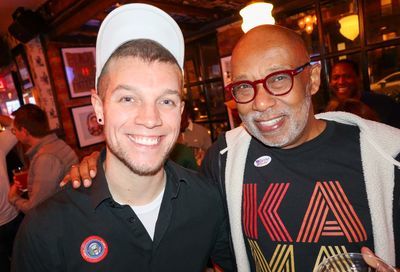THE JOURNEY TO KAFIRISTAN
Saturday, Oct. 26, 7 p.m.
Lincoln Theatre, $9



The temptation, given recent world events, may be to seek out any film that crosses the beguiling landscapes of the Iran and Afghanistan, searching for some clues to a history and heritage that we in the U.S. best understand a little better than we have over the past 50 years of involvement there. But what we are given in Fosco and Donatello Dubini’s Journey to Kafiristan is more a clue to the European (and now American?) identity, at least as far as escapism goes during times of political and social conflict. In this instance, we meet with Ella Maillart and Anne Marie Schwarzenbach, real women who really did travel across the Balkans, Turkey, and Persia just as war was festering in their native countries back in Europe in 1939.
In this account, based on Maillart’s book The Cruel Way: Two Women and a Ford in Afghanistan, both women desperately seek escape from their personal dramas and the social unrest of their homelands. Both seek some sort of idyllized destination: one (Ella) in search of a sacred home and salvation, in her mind connected with the place called Kafiristan; and the other (Anne Marie) in search of the home in her companion’s arms. Both will be foiled in their attempts, in part due to external forces of war and in part due to the internal forces of self-destruction. The landscapes and historical background of Journey to Kafiristan may remind you of The English Patient, but the themes are more personally devastating (and less schlocky) here.
Where The English Patient was basically a soap opera saved by gorgeous cinematography, Journey to Kafiristan is a fuller, though still flawed, work of art. The patient eye and camerawork of Matthias Kälin, drawing out the lush greens and the washed-out taupes and mustards of both deserts and highlands, are well-matched by the sere landscape of the script as well as the perfectly spare, unadorned acting of the leads. There is little room for sentimentality here, but all kinds of clean desert space are cleared for torment and for nihilism. In the end, Journey is worth seeing for the landscapes and for the few moments of interaction between the indigenous people around Ella and Anne Marie, but the fragile and crumbling relationship between them is an old story of desperation between women not knowing how to love each other well. It certainly is "a cruel way" that Elle and Anne Marie choose, and it’s hard to see what they gain as a result. — NL
Support Metro Weekly’s Journalism
These are challenging times for news organizations. And yet it’s crucial we stay active and provide vital resources and information to both our local readers and the world. So won’t you please take a moment and consider supporting Metro Weekly with a membership? For as little as $5 a month, you can help ensure Metro Weekly magazine and MetroWeekly.com remain free, viable resources as we provide the best, most diverse, culturally-resonant LGBTQ coverage in both the D.C. region and around the world. Memberships come with exclusive perks and discounts, your own personal digital delivery of each week’s magazine (and an archive), access to our Member's Lounge when it launches this fall, and exclusive members-only items like Metro Weekly Membership Mugs and Tote Bags! Check out all our membership levels here and please join us today!


















